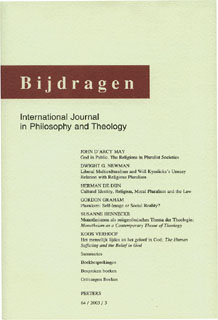 previous article in this issue previous article in this issue | next article in this issue  |

|
Document Details : Title: De jeugd in de filosofie - The Impact of Youth in Philosophy Subtitle: Een onderzoek naar de existentiële grondslagen van het jong hegelianisme - An Investigation into th Existential Foundation of Young Hegelianism Author(s): DE VRIESE, Herbert Journal: Bijdragen Volume: 67 Issue: 1 Date: 2006 Pages: 42-71 DOI: 10.2143/BIJ.67.1.2005615 Abstract : Young Hegelianism has often been identified as a crucial element in the reorientation of Western philosophy during the mid-nineteenth century. Due to its substantial contribution to the ‘revolutionary rupture’ between Hegel and Nietzsche, it is even said to have had a direct and lasting influence on the identity of philosophy today. This article attempts to shed a new light on the Young Hegelians’ radical critique of traditional philosophy by focusing on their existential condition as youngphilosophers. More particularly, it attempts to see their revolutionary philosophical project from the perspective of a generation conflict. In order to underline the validity of this perspective, three specific arguments are elaborated and brought together. The first draws attention to the fact that the emergence of an independent youth generation was a totally new phenomenon in European civilization at that time. By demonstrating its intrinsic relationship with rebellious youth movements such as Young Italy, Young Europe and Young Germany, Young Hegelianism is situated in the social and political context of a wide-ranginggeneration conflict in European culture. The second argument establishes that the name ‘Jung-Hegelianer’ was anything but an external or superficial indication since, by the end of the 1830ies, it became the consciously preferred self-identification of the radical fraction within the Hegelian school. Hence, the use of the prefix ‘young’ should be associated with the then prevailing subversive meaning of the term, expressing the belief in a whole-sale cultural renewal by the young generation. The third and final argument reveals how the philosophical revolution of the Young Hegelians is fundamentally linked with Hegel’s dialectical understanding of the different stages of life. In that respect, their name also expresses a well-considered philosophical choice for the stage of youth and accordingly determines a specific way of philosophizing. |
